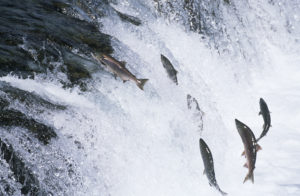Hydraulic Project Approvals Overreach
March 8, 2019

HB 1579, Chinook abundance, really deals with the Department of Fish and Wildlife’s (DFW) Hydraulic Project Approvals (HPA), unfortunately, passed the House yesterday in a near party-line vote. This bill has been around for years and is merely a retread of bad proposals with a “whale washed” title in hopes of making it more palatable to the legislature.
BIAW’s main opposition stems from the repeal of mandatory issuance of an HPA (currently, DFW must issue with or without conditions) of a residential bulkhead. It’s important to understand why this exists in current law – because shoreline residential development has to comply with the local government’s adopted Shoreline Master Program requirements. These regulations and laws already place a high standard on bulkhead construction. The environmental protections for fish habitat are already in place. Removing the state’s required approval places an additional burden of proof on a residential owner which may be a completely different standard than that of the local government, which they would also have to comply with. This is unfair.
In addition, removing the requirement for DFW to approve the HPA for a residence without defining clear enforcement jurisdiction of when an HPA is required leaves property owners without the ability to tell when or if they even need to apply for a permit. How can citizens or businesses be expected to know when the need for an HPA exists without a clear jurisdictional line? Without clear jurisdiction enforcement, there are inconsistencies. Inconsistent application of the law is unfair and inequitable.
All of this is then compounded by the move from criminal to civil enforcement and stop work orders. For stop work orders, DFW can issue them a fine for not complying and stop work – even if they are compliant with the local development and shoreline regulations.
While this bill claims to be about helping the Southern Resident Orca population it applies statewide, far from the Puget Sound and in non-chinook bearing waters, where existing and new single-family homes are not only limited for the wealthy. Those who can least afford to navigate through the complexities of this approval process will be hurt the most.
Laws, in order to be just and equitable, need to be clear regarding when and where it applies to those who are to be governed by it.
